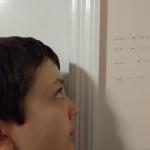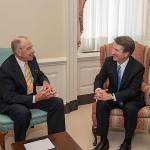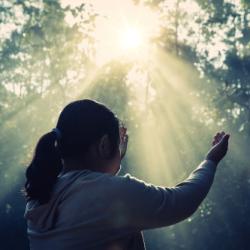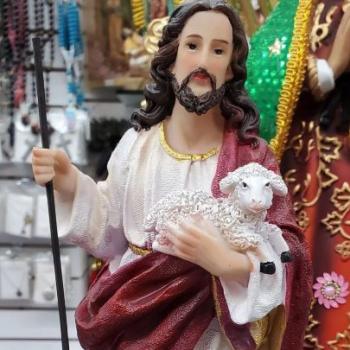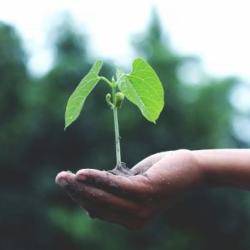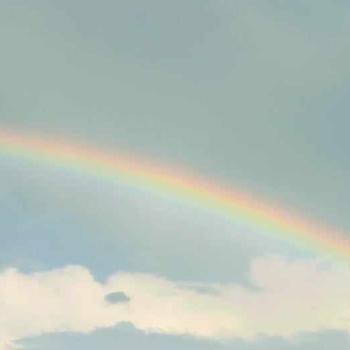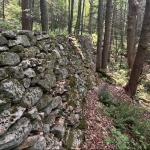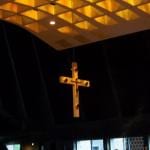Phil Snider has collected and arranged an important volume of sermons called Preaching as Resistance: Voices of Hope, Justice & Solidarity (Chalice Press, 2018) that will both spark ideas and bolster your courage. This collection of 30 sermons will help readers and preachers find courage and practice resistance during this challenging time.
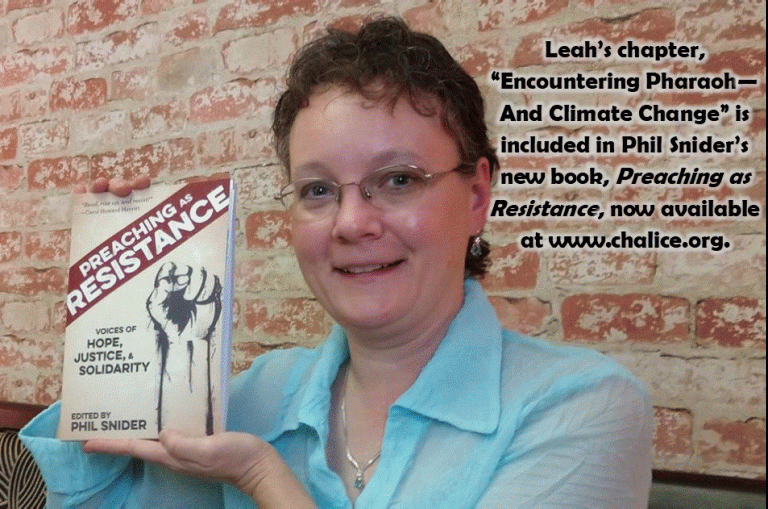
My sermon, “Encountering Pharaoh – and Climate Change,” is in Chapter 15 and was originally preached in 2015 at United in Christ Lutheran Church in Lewisburg, Pennsylvania. On the Sunday of this sermon, the congregation brought frogs to church—toy frogs, plush frogs, frog decorations and posters, and even live frogs in containers. So the entire sanctuary was filled with frogs! The sermon makes a connection between the destructive reign of Egypt’s Pharaoh and the fossil-fuel Pharaohs of our time. The sermon is a reminder that powerful forces of oppression and destruction aren’t limited to one particular political figure or time, but are with us in myriad ways over many eras.
______________________________
Scripture readings: Exodus 7:1–7; Exodus 8:1–15
How did they get themselves into this mess? Frogs everywhere! In their sinks, in their shoes, in their pots and in their pews!
One frog hopping is a source of delight. Hundreds of frogs keep you awake all night!
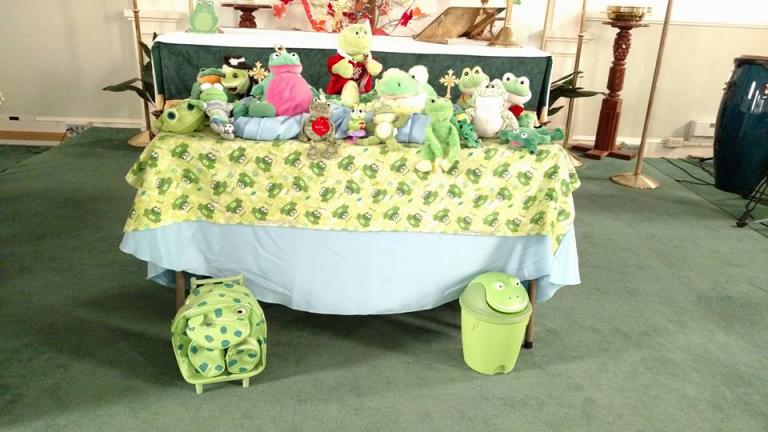
Where did this mess come from? And what are they going to do about it? Everyone is looking to Pharaoh, the mighty ruler of Egypt, to wield his divine power and rid the land of these ambitious amphibians. But they’re beginning to suspect that maybe Pharaoh isn’t as powerful as the propaganda says he is.
If Pharaoh can’t even control a simple thing like frogs, maybe they need to reconsider who’s really in charge here.
While the people might be thinking that, Pharaoh certainly was not. Pharaoh relied on himself and his own power. That power was very real, and it was symbolized by the panoply of gods and goddesses that were believed to control all aspects of Egyptian life. The goddess of the Nile, for example, controlled the river which was the lifeblood of the valley. But since Pharaoh controlled the priests who consorted with the river goddess, he believed that he controlled the water.
Similarly, the goddess of birth had a symbol, too. It was a frog. Since Pharaoh controlled the priests who consorted with that goddess, he also believed he controlled the fertility of his people.
And on it went. This assumption that Pharaoh controlled the supernatural spectrum extended to all aspects of life and creation. Pharaoh controlled the crops and harvest. Pharaoh controlled the livestock. Pharaoh controlled people’s health. Pharaoh controlled their children. Pharaoh even believed he controlled the light of the sun itself. But worst of all, he believed he controlled the very forces of life and death. It did not matter to him that this belief resulted in suffering when God disrupted his cruel reign. What mattered was securing his own position, wealth, and power at all costs.
Does any of this sound familiar in our own time?
We, too, have leaders who believe they control the world’s resources and wealth. They have almost god-like power. The rulers of global corporations, governments, and elite financial centers are the Pharaohs of our time who believe they are answerable to no one. They serve the god of profit, commodifying every aspect of the earth and people’s labor.
“Who am I to go to Pharaoh?” Moses asked when God called him to confront the supreme leader in order to free the Israelites. “What is one person in the face of these awesome powers? What difference can I possibly make? Pharaoh is too big—too big to fail—and I am nothing but a peon. It will make absolutely no difference whether I act or not.”
God begs to differ. Because there is nothing that irritates God more than someone who thinks he’s god.
Whether it’s people or organizations, corporations or governments—when they control so much and can act with such impunity, this really gets under God’s skin. So God sends Moses and Aaron to bring a message to Pharaoh: let my people go to worship the true God. Because you are not god, Pharaoh. You only think you are. And if you do not humble yourself before the true God, there will be dire consequences for you and all those who support your reign.
Pharaoh, of course, responded the way most people in power do when they are confronted. He hardened his heart. Kavad-lev is the word in Hebrew. Whether it was by God’s action or his own, the result was the same. Pharaoh’s heart was made impermeable and impenetrable with his own riches and glory. He made himself dense with his own sense of omnipotence. His heart became insensitive. He could not feel.
So God had to bring down every one of Pharaoh’s illusions of power in order to break through to his heart. God sent plague after plague to reveal the impotence of Egypt’s gods, and, by extension, Pharaoh himself. The river was turned to blood until Pharaoh promised to let the people go. But then he went back on his word when Moses returned the water to its previous state of cleanness. Frogs filled his palace and the homes of all his people, and then lay dying and stinking in the hot sun.
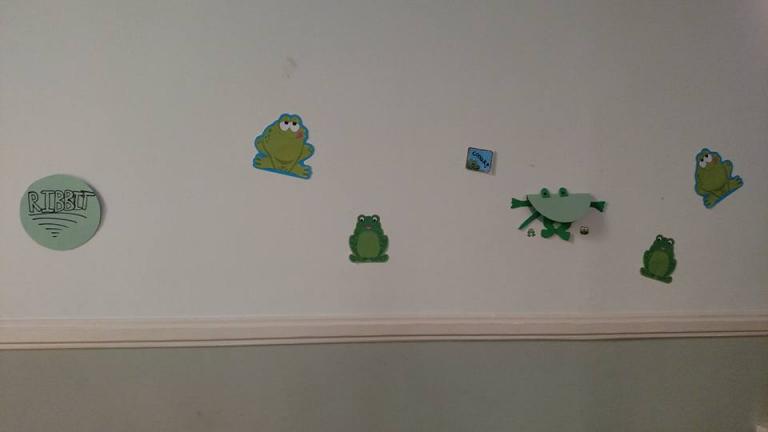
It became apparent that Pharaoh really had no power over birth or any other part of Creation.
Flies. Gnats. Boils on the skin. Locusts. Severe weather events that destroy crops. Strange diseases that kill livestock. Every one of those plagues meant another false god crumbled, along with Pharaoh’s own power. He was given multiple chances to humble himself and recognize that his place was to serve his people, and to serve God’s Creation, not to dominate them and use them for his own profit. But never once did he release his grip on his power or his people. So when God finally brings him all the way down to his knees, cradling his dead son, Pharaoh drags an entire nation down with him. It is a devastating reckoning.
When I look around at our world today and see the devastation brought on by global climate disruption, I wonder if we are witnessing another devastating reckoning of biblical proportions.
The plagues are upon us. Invasive species. Alternating floods and droughts. Severe weather events. Decimated crops. Strange diseases in our fish and livestock, as well as our own bodies.
Are there messages in these plagues that we are not heeding? Are those of us who have enjoyed decades of privilege hardening our hearts to the suffering of those most vulnerable just so we can enjoy the lifestyle of a rich Pharaoh? Are we worshiping gods that are illusions? Are we being given opportunities to humble ourselves and recognize that our place is to serve each other and to serve God’s Creation, rather than dominate them and use them for our own profit? And are we in danger of bringing down an entire planet by not releasing our grip of privilege and dominance?
Perhaps we shouldn’t be too hard on Pharaoh.
Maybe it wasn’t just blind stubbornness that encased his heart with stone-cold steel. Maybe it was plain, old-fashioned fear. He knew that if he released the Israelites, his country would lose its energy source, and he would lose the source of his god-like control. The Israelite slaves were what fueled the Egyptian economy. Freeing the Hebrews would have meant disruption, change, and the loss of free labor that enabled their incredible wealth and comfort. But that wealth came at the expense of incredible suffering.
However, it was more than just wealth. Allowing the Israelites their freedom to worship God would have meant Pharaoh and the Egyptians would lose their sovereignty. Their dominion was dependent on the subjugation of the Israelites. They refused to see that at the core of their identity and their national pride was the humiliation and deaths of countless people.
Maybe on some level, Pharaoh and the Egyptians knew that if they let themselves truly see the suffering of the people they enslaved, they would be overcome by guilt and grief. Those are feelings no one wants to experience. So Pharaoh and the Egyptians tightened their grip and hardened their hearts, defying the commands of God.
Maybe the hardening of hearts we see today is also driven by plain, old-fashioned fear.
If we release our grip on fossil fuels, we will lose our energy source. That’s a scary prospect. But there is a cost to this seemingly cheap energy that is too high to pay. The pollution of air, water and land. The cancers and other health issues of those who live in the “sacrifice zones” of the industry. The melting of glaciers and flooding of island nations and coastlands as the atmosphere warms from CO2 trapping the sun’s heat. Yes, the transition to renewable energy means radical change. But there are healthier ways to power our economy that do not lead to a climate breakdown and ecological sepsis. No amount of wealth and comfort is worth this kind of suffering.
But it’s more than just wealth. Many people worry that if we agree to international climate accords, the United States will lose its sovereignty. Yet the reality is that our dominion is dependent on the subjugation of the entire planet. We are refusing to see that at the core of our identity and national pride is the humiliation and death of humans and Earth-kin alike.
Maybe on some level, our leaders and we ourselves know that if we truly see the suffering of people enslaved to our fossil fuel addiction, we will be overcome by guilt and grief. And that can be paralyzing. So we tell ourselves – better to hold on to what we’ve worked so hard to build. Better to tighten the grip, harden our hearts, and dig in our heels. Even if it means defying the commands of God.
But here’s the thing: God has already made the decision that injustice can no longer rule.
Trying to grasp the old ways only leaves us with clenched fists and hardened hearts. The enslavement of Earth and human beings is no longer the way we can fuel our economy. What worked before isn’t working now. And, truth be told, it never worked that well to begin with. Because look at the mess it’s gotten us into.
Relying on the Fossil Fuel Pharaohs brings us nothing but disease, catastrophes, and death.
So the question for us is this: Will we continue to harden our hearts and clench our fists? Or will we loosen our grip, open our hearts, and trust that God has something else in store for us?
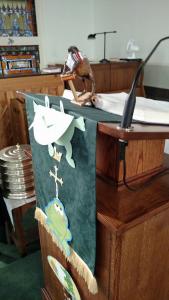
It’s time to turn the plague of frogs into the acronymn F.R.O.G.: Fully Rely On God. It’s time to soften our hearts, open our hands, and give ourselves over to the task of making the just transition to an economy powered by sun, wind, waves, and geothermal energy. It’s time to let go of our excuses and stop rationalizing our self-serving reasons for hardening our hearts.
It wouldn’t have been so bad if Pharaoh’s decisions only affected himself.
But what he failed or refused to realize is that his stubbornness would be the downfall of his people. When the stoniness of his heart finally cracked, the pieces fell and crushed everyone around him, including his own beloved son. Just as he ordered the children of the Hebrews to be murdered, he would now watch his own son die in his arms from a plague of his own making.
And that is the real tragedy, isn’t it? When the ones in charge, the ones with power, influence, and resources make the decision not to care, not to act, not to respond to God’s command, it is ultimately the children who suffer. The children of Egypt suffered from the plagues because the adults refused to respond to God’s commands.
So it is today, and so it could be far into the future if we do not learn the lessons of Egypt.
The ones in charge, the ones with power, influence, and resources have made the decision not to care, not to act, not to respond to God’s command to live in right relationship with Earth. They have harden their hearts. They may believe they have every right and reason to do so. But who ends up suffering in the end? The children. This is what is breaking my heart. I fear that we are giving up on our own children and their future.
But I also know this: the children of Earth are not giving up on us.
They are rising up in court rooms and classrooms, on Native reservations and at international conferences. They are calling us to account. Like Moses sent from the burning bush, they are demanding that we release them from the chains of fossil fuels. God’s voice speaks through them – let my children go! Release them to live in a world with clean water and air, with forests and healthy ecosystems, with birds and animals who have enough room to live and grow and thrive.
They are demanding that we take care of this Earth and rebuild the foundations of our economy and energy. They are calling on us to clean up and restore the systems they need to survive – the health system, the education system, the food system. And they are fully relying on God to lead them into a promised land. It’s time to join them and discover just how powerful our God really is.
Visit Chalice Press to get your copy of Preaching as Resistance today!
See also: Creation-Crisis Preaching: Ecology, Theology, and the Pulpit (Chalice Press, 2015).
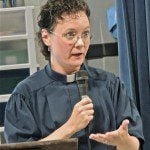
Leah D. Schade is the Assistant Professor of Preaching and Worship at Lexington Theological Seminary (Kentucky) and author of the book Creation-Crisis Preaching: Ecology, Theology, and the Pulpit (Chalice Press, 2015).
Twitter: @LeahSchade
Facebook: https://www.facebook.com/LeahDSchade/
Looking for more sermons and essays about faith and climate change? Check out these links:
Noah’s Ark and Climate Change: What Kind of Church Will We Be?
What Can A Person of Faith Do About Climate Change?
Exit Paris? Enter Pentecost! A Christian Response to Reneging on the Climate Promise


